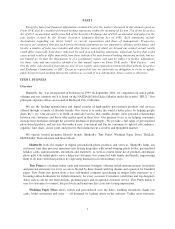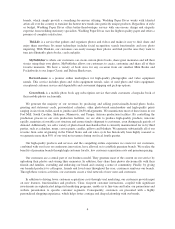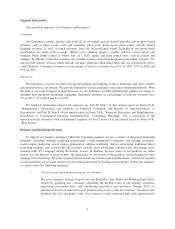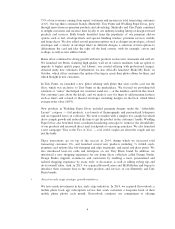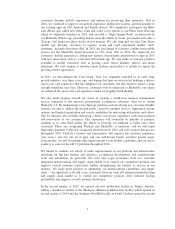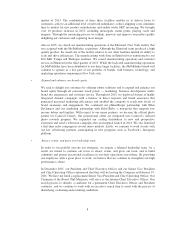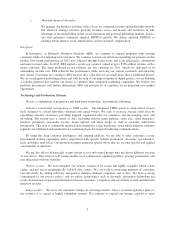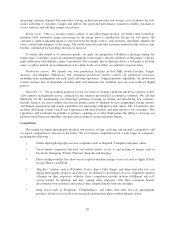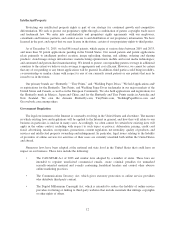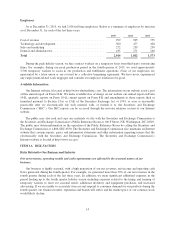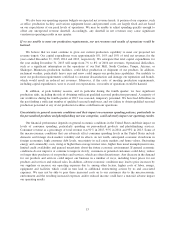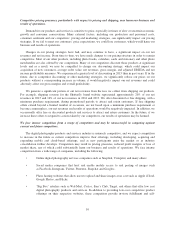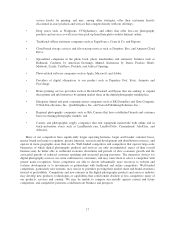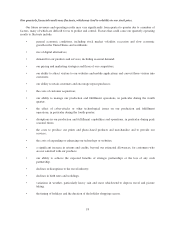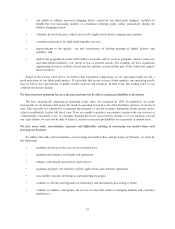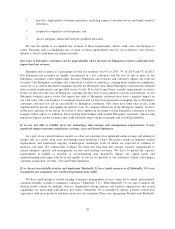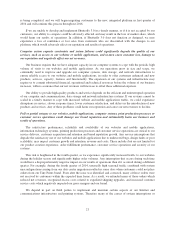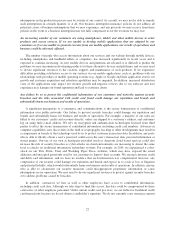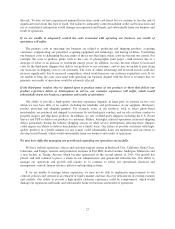Shutterfly 2015 Annual Report Download - page 15
Download and view the complete annual report
Please find page 15 of the 2015 Shutterfly annual report below. You can navigate through the pages in the report by either clicking on the pages listed below, or by using the keyword search tool below to find specific information within the annual report.• The Children’s Online Privacy Protection Act and the Prosecutorial Remedies and Other Tools to
End Exploitation of Children Today Act of 2003, which are intended to restrict the distribution of
certain materials deemed harmful to children and impose additional restrictions on the ability of
online services to collect user information from minors. In addition, the Protection of Children
From Sexual Predators Act of 1998 requires online service providers to report evidence of
violations of federal child pornography laws under certain circumstances.
• Statutes adopted in the State of California and other states, require online services to report certain
breaches of the security of personal data, and to report to consumers when their personal data might
be disclosed to direct marketers.
• The federal Credit Card Accountability Responsibility and Disclosure Act of 2009 (the “CARD
Act”) includes provisions governing the use of gift cards, including specific disclosure requirements
and a prohibition or limitation on the use of expiration dates and fees. Each state regulates gift cards
in its own manner, so long as in concert with the CARD Act. Several states are attempting to pass
new laws regulating the use of gift cards and amending state escheatment laws to try to pass new
laws regulating the use of gift cards and amending state escheatment laws to try and obtain unused
gift card balances.
• The Restore Online Shoppers’ Confidence Act (“ROSCA”) prohibits and prevents Internet-based
post-transaction third party sales and imposes specific requirements on negative option features.
• The Patient Protection and Affordable Care Act (the “Patient Act”), as well as other healthcare
reform legislation being considered by Congress and state legislatures. Changes to our healthcare
costs structure could increase our employee healthcare-related costs.
To resolve some of the remaining legal uncertainty, we expect new U.S. and foreign laws and regulations to
be adopted over time that will be directly or indirectly applicable to the Internet and to our activities. In addition,
government agencies may begin regulating previously unregulated Internet activities or applying existing laws in
new ways to providers of online services. Moreover, the law relating to the liability of providers of online
services for activities of their users and business partners is currently unsettled both within the United States and
abroad. Any existing or new legislation applicable to us could expose us to government investigations or audits,
prosecution for violations of applicable laws and/or substantial liability, including penalties, damages, significant
attorneys’ fees, expenses necessary to comply with such laws and regulations or the need to modify our business
practices. From time to time, claims may be threatened against us for aiding and abetting, defamation,
negligence, copyright or trademark infringement, or other theories based on the nature and content of information
to which we provide links or that we or others post online. On a more general level, government regulation of the
Internet could dampen the growth in the use of the Internet, have the effect of discouraging innovation and
investment in Internet-based enterprises or lead to unpredictable litigation.
We post on our websites our privacy policies and practices concerning the use and disclosure of user data.
Any failure by us to comply with our posted privacy policies, Federal Trade Commission requirements or other
privacy-related laws and regulations could result in proceedings that could potentially harm our business, results
of operations and financial condition. In this regard, there are a large number of federal and state legislative
proposals before the United States Congress and various state legislative bodies regarding privacy issues related
to our business. It is not possible to predict whether or when such legislation may be adopted, and certain
proposals, such as required use of disclaimers, if adopted, could harm our business through a decrease in user
registrations and revenues.
13


